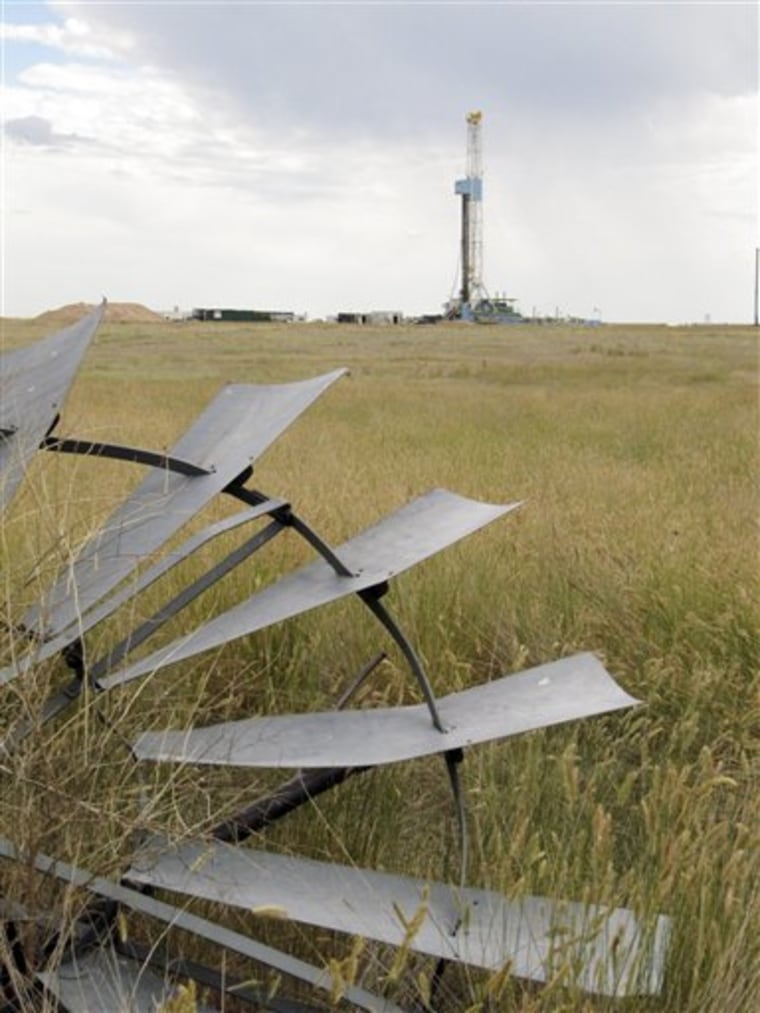A well named Jake and a controversial drilling technique are fueling a Western oil rush, raising hopes for economic revival and questions about the environment — and who's going to share in the wealth.
Not many wells have been drilled yet, but just about everything else is in place for an oil boom in eastern Wyoming, northern Colorado and western Nebraska, where the Niobrara Shale and its hard-to-tap crude lay nearly two miles underground.
Preliminary work is under way to map underground geological formations to figure out the best places to drill. Oil prospectors are poring over courthouse records to see who holds mineral rights so they can negotiate deals.
Companies large and small are betting millions that the Niobrara holds gobs of recoverable oil like the similar — and booming — Bakken Shale field in western North Dakota. With oil money leading the way, North Dakota has coasted through the recession with 3.6 percent unemployment, the lowest of any state, and a budget surplus of over $500 million.
Wealth like that could transform Cheyenne, a wind-swept state capital with too many vacant old buildings, and other parts of the exploration area with more jobs, more tax revenue and bustling support businesses.
Surely everyone is excited, right?
Not exactly, not with so many questions still to be answered.
"I've got mixed emotions about it, really. In the past, it's just been a farmer community," farmer Todd Martin said as he unloaded wheat from a truck to a bin in Carpenter, a town with dirt streets and maybe 100 people 25 miles southeast of Cheyenne. "It's going to change some people's lives, if they hit."
Hardly anyone outside the industry talks about the oil rush for long without mentioning, apprehensively, the Gulf of Mexico catastrophe. Such a difficult-to-end spill would be hard to imagine happening here.
That doesn't mean an oil boom couldn't create a booming headache.
Even minor spills would be a very up-close-and-personal problem for homeowners, particularly in the wide ring of fairly new homes on 5- to 40-acre lots surrounding Cheyenne.
"That Gulf deal makes you a little uneasy," said Paul Terry, a former Oregon logger who moved to his house on 10 acres north of Cheyenne a couple years ago. "If I had them messing with my stuff, I'd want some ground rules. I'm not against it, but I'm not saying give them a free hand."
He said three companies have approached him in the last few months about possibly drilling beneath his property.
As in the Bakken, drilling in the Niobrara wouldn't be profitable without hydraulic fracturing, or fracking, which some have blamed for groundwater contamination. It involves pumping a pressurized mix of water, sand and chemicals underground to crack open fissures and improve the flow of oil or gas.
The Wyoming Oil and Gas Conservation Commission in June passed a range of tougher state rules for oil and gas drilling, including fracking.
Martin said he researched fracking online and believes it's probably safe enough for his farm on the Colorado-Wyoming line.
"If they cut corners, then sure, it can contaminate the groundwater," he said. "You hope they do it the way they're supposed to."
The situation is complicated by the fact that many people don't own the rights to minerals beneath their land. Whoever does has a right to put an oil well in your yard, with or without your permission, and doesn't have to share the profits — just the pollution.
Even among those who own their minerals, not all are daydreaming much about getting rich.
"Beverly Hillbillies, rags to riches, we've got oil? Not necessarily," said Diane Bishop, who owns 70 acres near Cheyenne. She and her husband, Rick, who are moving here from Texas and plan to build a log home on their land later this year, own the mineral rights beneath half of their property.
"We'll be lucky to get enough money to pay the taxes on our property out there," Bishop said.
Companies intend to drill not only downward to the Niobrara but also horizontally, sometimes half a mile or more, after reaching the formation. That means one well could cross beneath several properties. Anyone who owned less than a substantial chunk of land — upward of a square mile — would have to divvy up royalties with at least one and possibly several neighbors.
Big-time landowners, mainly cattle ranchers who own their minerals, would be in the best position to strike it rich.
All of this speculation began with Jake. The well in far northern Colorado was yielding 1,770 barrels of oil a day — eye-popping production for this region — after it was drilled and fracked for Houston-based EOG Resources last fall. Jake's production has tapered off significantly, as usually happens, but not before other companies took notice.
An old-fashioned land rush was on.
So far this year, more than 100 drilling permits have been granted in southeast Wyoming, far surpassing all previous activity in the area.
Meanwhile, Wyoming has reaped a record $101 million since May by auctioning off rights to drill on state land, the vast majority of it in the eastern part of the state. Nebraska and Colorado have set similar records.
The big question is how much oil is down there, and all eyes are on the next wells to be drilled. As soon as this fall, they could show whether a wide swath of the Niobrara covering hundreds of square miles is likely to be as productive as the Bakken, said Bruce Hinchey, president of Petroleum Association of Wyoming.
"If they come in pretty good, I think next year is going to be a barn-burner," he said.
